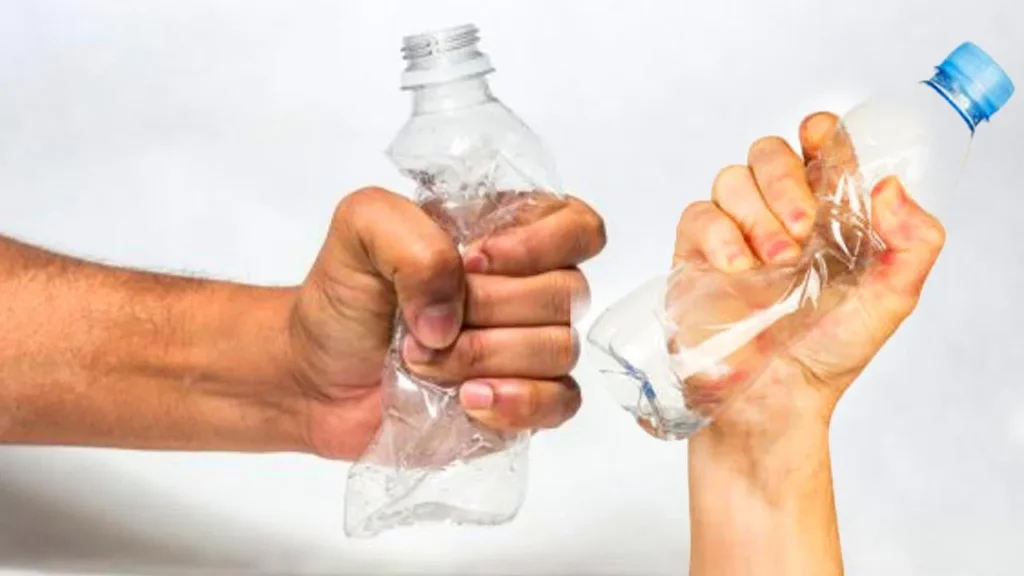wellhealthorganic.com know why not to reuse plastic water bottles know its reason in hindi
Know why plastic water bottles should not be reused? Know its reason
Plastic water bottles have become an important part of our daily lives given their convenience and portability. However, the harmful effects of single-use plastic on the environment cannot be negated. While the notion of reusing these bottles may seem like a sustainable and sensible solution, there are still several important reasons why it should be done. Let’s see what are these reasons to reuse plastic water bottles.

Bacterial Growth:
Reusing plastic water bottles increases the risk of bacterial contamination. No matter how thoroughly the bottle is washed, small scratches and crevices can harbor bacteria in the bottle, which can multiply rapidly. This poses a health risk, especially if the bottle is not cleaned properly or regularly.
Degradation of Plastic:
Plastic water bottles are typically made from polyethylene terephthalate (PET), which degrades over time with repeated use and washing. When exposed to heat or sunlight, plastics can break down and release harmful chemicals into the water, which degrades water quality and safety.
Possible chemical leaching:
Reuse and unnecessary exposure to different temperatures can cause plastic water bottles to release chemicals into the water. Bisphenol A (BPA) and phthalates are common chemicals found in plastics, which have been linked to a number of health problems like hormonal imbalance, reproductive problems, and even cancer.
Environmental Effect:
Despite reusing plastic water bottles, a significant portion still ends up in polluting locations underground or in the ocean. Reusing these bottles increases the demand for single-use plastics, which harms the environment and poses an existential threat to life.
Availability of safe options:
Luckily, there are many eco-tolerant alternatives to plastic water bottles. Stainless steel, glass, and BPA-free reused plastic bottles are durable, safe, and environmentally friendly alternatives that can eliminate the dangers associated with plastic bottles.
Conclusion:
The concept of reusing plastic water bottles may seem like a simple way to reduce waste, but the potential health hazards and environmental impacts outweigh any sustainable benefits. It is important to prioritize protecting your health and the environment. By making the right choices and adopting eco-tolerant practices, we can contribute to a cleaner and healthier future.
Therefore, you should be careful about reusing plastic water bottles and try to use other eco-tolerant options. This can help us support a clean, healthy, and balanced environment and increase the chances of a better life for the generations we leave behind.
How many times can plastic water bottles be reused?
In fact, plastic water bottles can be reused once or twice at most, if they are treated with special care after washing. But it comes with its own dangers, and it depends on the conditions.
Are some bottles considered more suitable for reusing plastic water bottles?
Yes, some plastic water bottles may be considered more suitable for reusing, as are those that contain most of the solid or solid food or water content. This makes the bottle safe to clean and use.
What are safe ways to reuse plastic water bottles?
To reuse plastic water bottles, the following are safe ways:
1. Clean the bottle every time and dry it thoroughly.
2. Wash the bottle with warm soap and water at regular intervals.
3. Keep the bottle dry, exposed to sunlight for a few days so that any bacteria can be destroyed.
What are other options for reusing plastic water bottles?
There are other eco-tolerant options, such as stainless steel, glass, or BPA-free reusable plastic bottles, which are safe for health and tolerant to the environment.
What are the benefits of reusing plastic water bottles?
Reusing plastic water bottles can subsequently have benefits, such as using less plastic, and reducing residual waste.




